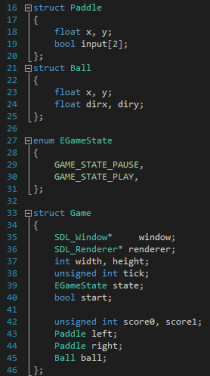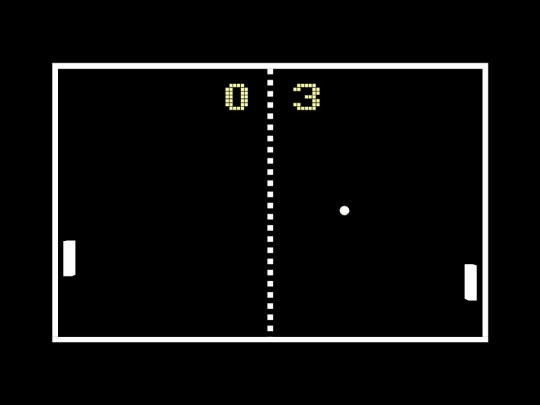Monthly Archives: November 2014

Programming – Week 2
Another week of programming has come to an end, and LOTS of new things has been introduced. We have been introduced to functions, arrays, references and pointers, how to use rand and srand to produce a random number. As you can see, lots of things. During thursday and friday we also had a workshop where we went through the code for the classic game Pong. This was done by using Visual Studio and SDL, which stands for Standard Digital media Library.
In the […]

Programming – Week 2
Another week of programming has come to an end, and LOTS of new things has been introduced. We have been introduced to functions, arrays, references and pointers, how to use rand and srand to produce a random number. As you can see, lots of things. During thursday and friday we also had a workshop where we went through the code for the classic game Pong. This was done by using Visual Studio and SDL, which stands for Standard Digital media Library.
In the […]

Programming – Week 2
Another week of programming has come to an end, and LOTS of new things has been introduced. We have been introduced to functions, arrays, references and pointers, how to use rand and srand to produce a random number. As you can see, lots of things. During thursday and friday we also had a workshop where we went through the code for the classic game Pong. This was done by using Visual Studio and SDL, which stands for Standard Digital media Library.
In the […]

Programming – Week 2
Another week of programming has come to an end, and LOTS of new things has been introduced. We have been introduced to functions, arrays, references and pointers, how to use rand and srand to produce a random number. As you can see, lots of things. During thursday and friday we also had a workshop where we went through the code for the classic game Pong. This was done by using Visual Studio and SDL, which stands for Standard Digital media Library.
In the […]
Week of fail
Have been trying to get the DirectX 11 to work with visual studio. somehow I couldn’t open the #pragma comment (lib, “d3dx11.lib”). something I really need. I later fixed it but got another error, LNK2019: unresolved external symbol _main referenced in function ___tmainCRTStartup. Found the problem later on, had to change the subsystem in the properties. More than that, I just read up on the different functions I will be using in DirectX.
Also this week I tried to download […]
Week of fail
Have been trying to get the DirectX 11 to work with visual studio. somehow I couldn’t open the #pragma comment (lib, “d3dx11.lib”). something I really need. I later fixed it but got another error, LNK2019: unresolved external symbol _main referenced in function ___tmainCRTStartup. Found the problem later on, had to change the subsystem in the properties. More than that, I just read up on the different functions I will be using in DirectX.
Also this week I tried to download […]
Second week of Game Programming 1 – Pong
This week we got introduced to our first session of game programming. We got introduced to SDL(Simple DirectMedia Library), the library we will be using in the course to create our own games. The game we got to work on and experiment with was Pong. Pong is a game simulating a game of table tennis. Our task was to implement movement and collision, it was a great task to get a feeling of how a basic game structure looks. However the code […]
Second week of Game Programming 1 – Pong
This week we got introduced to our first session of game programming. We got introduced to SDL(Simple DirectMedia Library), the library we will be using in the course to create our own games. The game we got to work on and experiment with was Pong. Pong is a game simulating a game of table tennis. Our task was to implement movement and collision, it was a great task to get a feeling of how a basic game structure looks. However the code […]
Programming – Week 2
This week we worked with pointers in C++. You create a pointer by adding a
” * ” at the end of the data type. Pointers works just like the name describes, it points towards a memory address instead of a value. To access a variables memory address you add ” & ” in front of the variable name. To access the value of a pointer you can use ” * ” in front of the pointer variable.
This is an example […]
Programming – Week 2
This week we worked with pointers in C++. You create a pointer by adding a
” * ” at the end of the data type. Pointers works just like the name describes, it points towards a memory address instead of a value. To access a variables memory address you add ” & ” in front of the variable name. To access the value of a pointer you can use ” * ” in front of the pointer variable.
This is an example […]
Programming – Week 2
This week we worked with pointers in C++. You create a pointer by adding a
” * ” at the end of the data type. Pointers works just like the name describes, it points towards a memory address instead of a value. To access a variables memory address you add ” & ” in front of the variable name. To access the value of a pointer you can use ” * ” in front of the pointer variable.
This is an example […]
Programming – Week 2
This week we worked with pointers in C++. You create a pointer by adding a
” * ” at the end of the data type. Pointers works just like the name describes, it points towards a memory address instead of a value. To access a variables memory address you add ” & ” in front of the variable name. To access the value of a pointer you can use ” * ” in front of the pointer variable.
This is an example […]
Programming: Week 2 (cont.)
Ex. 10
Write a program that generates a random symbolic game map that contains characters. Use the following characters:
# represents a wall
& represents a tree
_ represents walkable area
This one is simple. Since we need to randomly choose one of 3 options, we generate an integer from the interval [0;2] (or [1;3], it doesn’t change anything).
#include
#include
#include
int random()
{
return rand() % 2;
}
int main(int argc, char* argv[]){
std::cout << std::endl;
srand((unsigned int)time(0));
for (int i = 0; i < 9; i++)
{
std::cout << " ";
for […]
Programming: Week 2 (cont.)
Ex. 10
Write a program that generates a random symbolic game map that contains characters. Use the following characters:
# represents a wall
& represents a tree
_ represents walkable area
This one is simple. Since we need to randomly choose one of 3 options, we generate an integer from the interval [0;2] (or [1;3], it doesn’t change anything).
#include
#include
#include
int random()
{
return rand() % 2;
}
int main(int argc, char* argv[]){
std::cout << std::endl;
srand((unsigned int)time(0));
for (int i = 0; i < 9; i++)
{
std::cout << " ";
for […]

Week 2
The second week or introduction to arrays,functions and memory, and this week only, start learning sdl(Simple direct-media layer).
This week has been full of interesting and useful things to learn.
First of is the functions that are the building blocks of programs/classes,constantly being used and reused as well as creating the different things you need to create the program.
Then there is arrays to hold many things in memory instead of having to create a variable for each thing you want to save […]

Week 2
The second week or introduction to arrays,functions and memory, and this week only, start learning sdl(Simple direct-media layer).
This week has been full of interesting and useful things to learn.
First of is the functions that are the building blocks of programs/classes,constantly being used and reused as well as creating the different things you need to create the program.
Then there is arrays to hold many things in memory instead of having to create a variable for each thing you want to save […]
Game Programming III – Blog Post 2
Late as usual, here’s my post about this week.
There’s been a lot of progress and new things in the network programming. Actually too much for me to write about here on a whim, but I’ll get right to it when I start on the second assignment which will be all about network programming.
Anyway, I’m pretty much done with my linked list, meaning that the very first assignment is halfway done. It took a little longer than I thought mainly […]
Game Programming III – Blog Post 2
Late as usual, here’s my post about this week.
There’s been a lot of progress and new things in the network programming. Actually too much for me to write about here on a whim, but I’ll get right to it when I start on the second assignment which will be all about network programming.
Anyway, I’m pretty much done with my linked list, meaning that the very first assignment is halfway done. It took a little longer than I thought mainly […]
Engine Design – Debug Console
I’m currently working on my own game engine and while it’s no where near from being finished, I’ve applied a couple of design patterns when creating the different systems. In the coming weeks I’ll go through a system each at a time and write about how I have implemented them and what problems I might have stumbled upon.
This week’s system is the debug console which I regularly use when debugging or changing stuff on the fly in-engine.
The debug console […]
Engine Design – Debug Console
I’m currently working on my own game engine and while it’s no where near from being finished, I’ve applied a couple of design patterns when creating the different systems. In the coming weeks I’ll go through a system each at a time and write about how I have implemented them and what problems I might have stumbled upon.
This week’s system is the debug console which I regularly use when debugging or changing stuff on the fly in-engine.
The debug console […]

